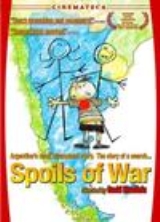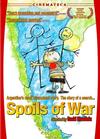
Spoils of War
Encyclopedia
Botín de guerra is a 2000
Argentine
documentary film
directed and written by David Blaustein
with Luis Alberto Asurey. The film premiered on 11 April 2000 in Buenos Aires
. David Blaustein
won two awards for Best Director and a 2nd and 3rd.

, at the time of the film's release 66 children had been located by their relatives. The film is in part a history of the Association of the Grandmothers of the Plaza de Mayo, and the story of their search for the missing children. It depicts the reunion of children and their relatives.
2000 in film
The year 2000 in film involved some significant events.The top grosser worldwide was Mission: Impossible II. Domestically in North America, Gladiator won the Academy Awards for Best Picture and Best Actor ....
Argentine
Cinema of Argentina
The cinema of Argentina has a tradition dating back to the late nineteenth century, and continues to play a role in the culture of Argentina....
documentary film
Documentary film
Documentary films constitute a broad category of nonfictional motion pictures intended to document some aspect of reality, primarily for the purposes of instruction or maintaining a historical record...
directed and written by David Blaustein
David Blaustein
David Blaustein is an entertainment correspondent and movie critic for ABC News Radio and a frequent contributor to ABC News Now.Blaustein attended Buffalo State College at which time he landed his first professional radio job with WWKB-AM as a board operator and talk radio producer...
with Luis Alberto Asurey. The film premiered on 11 April 2000 in Buenos Aires
Buenos Aires
Buenos Aires is the capital and largest city of Argentina, and the second-largest metropolitan area in South America, after São Paulo. It is located on the western shore of the estuary of the Río de la Plata, on the southeastern coast of the South American continent...
. David Blaustein
David Blaustein
David Blaustein is an entertainment correspondent and movie critic for ABC News Radio and a frequent contributor to ABC News Now.Blaustein attended Buffalo State College at which time he landed his first professional radio job with WWKB-AM as a board operator and talk radio producer...
won two awards for Best Director and a 2nd and 3rd.

Overview
This second film from Argentine producer David Blaustein is a documentary concerning one particular result of Argentina's "dirty war" period (1976–1983): the "appropriation" of children by members and friends of the right-wing military junta. Students and young people considered political opponents of the regime were "disappeared" into a number of secret prisons spread throughout the country; some were couples or married, and some cases the women prisoners were pregnant. It is estimated more than 500 children and infants were taken from their "disappeared" parents. In some cases these children were placed at orphanages or foster homes; in others, the children were simply taken by right-wing families to raise. In almost all cases, the children grew up without any knowledge of the circumstances of their adoption or the fate of their biological parents. Thanks to the efforts of the Grandmothers of the Plaza de MayoGrandmothers of the Plaza de Mayo
The Grandmothers of the Plaza de Mayo is a human rights organisation with the aim of finding the babies stolen during the era of the Argentine dictatorship known as the "Dirty War" . Its president is Estela Barnes de Carlotto....
, at the time of the film's release 66 children had been located by their relatives. The film is in part a history of the Association of the Grandmothers of the Plaza de Mayo, and the story of their search for the missing children. It depicts the reunion of children and their relatives.

